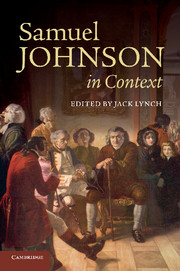Book contents
- Frontmatter
- Contents
- Illustrations
- Contributors
- Preface
- Chronology
- Abbreviations
- Part I Life and works
- Part II Critical fortunes
- Chapter 4 Editions
- Chapter 5 Translations
- Chapter 6 Critical reception to 1900
- Chapter 7 Critical reception since 1900
- Chapter 8 Representations
- Chapter 9 Reputation
- Part III Contexts
- Further reading
- Index
- References
Chapter 7 - Critical reception since 1900
from Part II - Critical fortunes
Published online by Cambridge University Press: 05 June 2012
- Frontmatter
- Contents
- Illustrations
- Contributors
- Preface
- Chronology
- Abbreviations
- Part I Life and works
- Part II Critical fortunes
- Chapter 4 Editions
- Chapter 5 Translations
- Chapter 6 Critical reception to 1900
- Chapter 7 Critical reception since 1900
- Chapter 8 Representations
- Chapter 9 Reputation
- Part III Contexts
- Further reading
- Index
- References
Summary
Rece′ption. n.s. [receptus, Latin.]
7. Opinion generally admitted.
Philosophers, who have quitted the popular doctrines of their countries, have fallen into as extravagant opinions, as even common reception countenanced. Locke.
Like Chaucer, Shakespeare, Milton, Wordsworth, Austen, and Dickens, Samuel Johnson has been accepted by the twentieth century as one of the great English writers. His life and writings have attracted enormous scholarly attention, yet they also appeal to students, professionals, and ordinary readers. Challenging and full of life, Johnson’s writings continue to hold out the possibility of new discoveries for many different kinds of readers, even those who know him well.
Scholarly attention to Johnson in the twentieth century falls into four general categories:
great scholarly editions of Johnson’s works by G. B. Hill, David Nicol Smith and E. L. McAdam, R. W. Chapman, J. D. Fleeman, Bruce Redford, and Roger Lonsdale, and The Yale Edition of the Works of Samuel Johnson;
impressive bibliographical works by J. D. Fleeman and others, which have established the large Johnson canon from his own time down to ours;
informative, inquiring biographies of Johnson by James L. Clifford, John Wain, Walter Jackson Bate, Thomas Kaminski, Robert DeMaria, Lawrence Lipking, and David Nokes, which have helped to structure the narrative of his intellectual and personal life; and
abundant and various critical interpretations which have increased our understanding of Johnson’s works in themselves, in relation to his life and the lives of his friends and associates, and in relation to a comprehensive range of historical and literary records.
- Type
- Chapter
- Information
- Samuel Johnson in Context , pp. 54 - 61Publisher: Cambridge University PressPrint publication year: 2011



